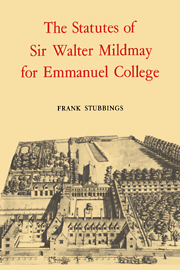Book contents
- Frontmatter
- Contents
- List of plates
- Preface
- Abbreviations
- Introduction
- The historical background
- The manuscripts
- The Statutes of Sir Walter Mildmay, Knight, Chancellor of the Exchequer and one of Her Majesty's Privy Council, authorised by him for the government of Emmanuel College, founded by him
- The College orders of 1588
- Statuta D. Gualtheri Mildmaii Militis Cancellarii Scaccarii et Regineae Maiestati a consiliis: quae pro administratione Collegii Emmanuelis ab eo fundati sancivit
- Statutum de Camera Consanguineis fundatoris reservand
- De mora sociorum in Collegio, et de gradu Doctoratus in sacra Theologia Susripiendo
- Index
- Plate section
The College orders of 1588
Published online by Cambridge University Press: 03 March 2010
- Frontmatter
- Contents
- List of plates
- Preface
- Abbreviations
- Introduction
- The historical background
- The manuscripts
- The Statutes of Sir Walter Mildmay, Knight, Chancellor of the Exchequer and one of Her Majesty's Privy Council, authorised by him for the government of Emmanuel College, founded by him
- The College orders of 1588
- Statuta D. Gualtheri Mildmaii Militis Cancellarii Scaccarii et Regineae Maiestati a consiliis: quae pro administratione Collegii Emmanuelis ab eo fundati sancivit
- Statutum de Camera Consanguineis fundatoris reservand
- De mora sociorum in Collegio, et de gradu Doctoratus in sacra Theologia Susripiendo
- Index
- Plate section
Summary
Introduction
With the De mora statute the Founder could regard his work as complete. There were no further additions or alterations to the statutes in his time. But matters of detail could of course be regulated by order of the Master and Fellows, and at the beginning of the first College orderbook (E.C.A., COL. 14.1) we find several pages of such regulations dated 10 December 1588. These are of much interest, both for the picture they give of daily life in the College, and for the detailed arrangements agreed upon for ‘mutuall conference or communication of gifts among students in Divinity’.
All these orders, printed below, were passed after experience of the first few years' running of the College. To the three Fellows initially appointed in 15 84 (Charles Chadwick from Christ's, William Jones and Laurence Pickering from Clare) four more had been added in 1585 (John Cock and Nathaniel Gilby from Christ's, William Branthwaite and John Richardson from Clare), another two (William Bright from Christ's and John Gray from Queens') in 1587, and a further three (John Duke, Richard Rolfe, and Robert Houghton) in 1588, thus bringing the total up to twelve as envisaged in chapter 39 (cf. notes on chapter 11 above). The last three, Duke, Rolfe, and Houghton, had been among the original Scholars at Emmanuel itself: the College had now duly proved itself viable as a self-perpetuating establishment. It was thus an appropriate time to review any regulations or practices that had developed. Whether their codification was carried out at the Founder's behest, we do not know; but it is possible.
- Type
- Chapter
- Information
- The Statutes of Sir Walter Mildmay , pp. 99 - 112Publisher: Cambridge University PressPrint publication year: 1983



